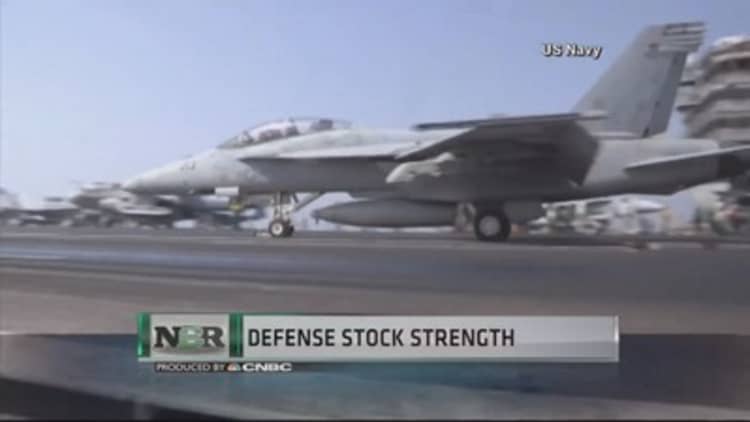The big U.S. defense companies have used piles of cash to increase share buybacks and dividends. Now they're going to move ahead on mergers and acquisitions, say analysts who follow the industry.
"This is the early stage of defense M&A activity," said Tess Oxenstierna, managing director of Headwaters MB, an investment banking and advisory firm that specializes in aerospace and defense. "What's happened in the last 12 to 18 months is an uptick. There's $2 trillion of cash sloshing around in the aerospace/defense market."
Consolidation among the major weapons makers — the so-called primes — is unlikely, because the Pentagon wants to ensure competitive bids for contracts. But experts say investors should look for deals involving lower-middle-market businesses, including some with hot niches such as cybersecurity, intelligence analysis and surveillance. Also, unmanned aerial vehicles, both strategic and tactical, are expected to see more M&A.
"You're going to see some of the cash that was used to buy back stock go towards M&A," said Joseph DeNardi, a defense industry analyst at Stifel.
Transformative M&A is something that you have to think really carefully about, because while it can be transformative, you've got to study carefully ... before you pull the trigger on something.James ReaganCFO, Leidos Holdings
In the third quarter of 2015, there were 15 deals in aerospace and defense with a total value of about $52 billion, according to a PricewaterhouseCoopers M&A report. The total value of deals so far this year is $64 billion, compared with $22 billion for all of 2014, the report said.
According to PwC, restructurings, divestitures and spinoffs are expected to remain popular among industry companies.
One of the year's largest deals was Lockheed Martin's $9 billion acquisition of Sikorksy Aircraft, maker of the Black Hawk helicopter. The seller — United Technologies — said in July after the Sikorsky deal was announced that it would maintain a "placeholder of $1 billion for M&A" but CEO Gregory Hayes also indicated at the time that "we can grow organically even without big M&A."
"Where we're seeing more consolidation is in the defense services companies," said RBC Capital analyst Steven Cahall. "I don't see the primes participating — and for the most part they've been sellers as opposed to buyers."
For example, Lockheed — the largest defense contractor — is shopping around its IT services businesses in a transaction that could be worth $4 billion to $5 billion. In April, BAE Systems indicated it was looking to sell certain U.S. services businesses but this month changed its mind and decided to retain the portfolio that includes cybersecurity operations.
Speaking speculatively, DeNardi said that one deal that would "make a lot of sense strategically" would be Northrop Grumman acquiring Orbital ATK, "due mainly to Orbital's exposure to higher-growth commercial end markets" as well as "a lack of meaningful product overlap." He has no knowledge of any transaction being imminent and says both companies have a lot on their plate right now — particularly Northrop, after recently being picked to build the next long-range strike bomber. "I don't think this is in the next 12 months. I think it's probably longer term."
What's unlikely is a merger between the big U.S. prime contractors. The Pentagon's acquisition chief, Frank Kendall voiced concern after the Lockheed-Sikorsky deal about what industry consolidation might mean in terms of U.S. military buying power. The Defense Department now wants to have the power to limit such big defense deals. Kendall told CNBC last month, "I'm working with my staff, and I'm working with Congress, and I'll be making some recommendations to Congress about what they might do along those lines."

Meanwhile, Engility Holdings and CACI International — two information technology companies with U.S. defense services — "have actively talked about being more aggressive in terms of M&A and being consolidators," according to Cahall.
Other defense service companies that have seen more deals overall include ManTech International, Booz Allen Hamilton, Science Applications International and Leidos Holdings.
"We've taken a hard look at a couple of things and passed on them," Leidos CFO James Reagan told investors earlier this month speaking at the Goldman Sachs Industrials Conference. "Transformative M&A is something that you have to think really carefully about, because while it can be transformative, you've got to study carefully ... before you pull the trigger on something."
Other possible industry consolidation targets include recently separated BWX Technologies, sole supplier of nuclear reactors to the U.S. Navy, and Oshkosh, which recently won the nearly $7 billion military contract to replace the Humvee.
Patriot missile firm Raytheon has been on a buying spree with deals for Blackbird Technologies and Websense, but it appears to have cooled on billion-dollar moves. CFO Toby O'Brien told analysts on the company's third-quarter earnings call last month that future deals "would be the more niche, targeted type of acquisitions that fill technology gaps or product gaps or customer gaps."





